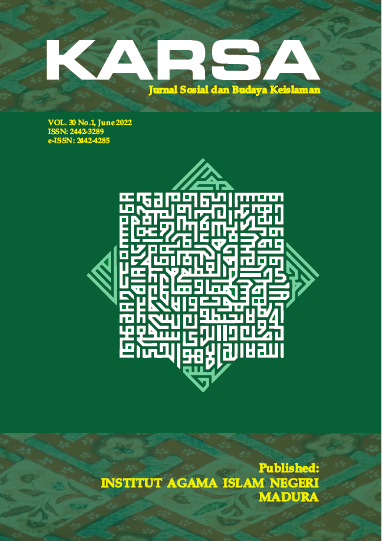Living Sunnah in Gayo Poetry Art: A Study of Abdurrahim Daudy’s Poems
 Abstract views: 440
,
Abstract views: 440
,
 PDF downloads: 384
PDF downloads: 384
Abstract
Religion and cultural customs coexist in the daily lives of Gayo people, including in the art of poetry. It is essential to know how Islamic values, as the religion of the majority of the population, play a role in shaping social behavior. This article aims to reveal the living sunnah side of Gayo poetry and how the traditions of the Prophet have been mentioned in a poem. The poetic works of Abdurrahim Daudy are the main focus of this paper. Since Daudy is a clerical and traditional figure in Gayo who has an artistic spirit in this modern era, it has become the main consideration why his poetic works are the focus of study in this paper. The data collection is done by library research and field research; namely, analyzing related literature, especially Daudy’s works, and conducting observations and interviews with several Gayo people. Using an anthropological approach and functionalism theory, all elements of culture are valuable parts of the society in which these elements are located. This study found that Syair, part of Gayo culture, has an essential role in shaping the behavior of the Gayo people themselves. However, in its development, the art of Gayo poetry has shifted in terms of lyrics and performance ethics which are increasingly superficial. However, the value of living the Prophet’s sunnah still seems to color Gayo’s poems, regardless of the motive of the person behind it, both as a poet and a listener.
Downloads
References
Ahnaf, Iqbal. “Haruskah HTI Dibubarkan.” CRCS UGM. Last modified May 2017. https://crcs.ugm.ac.id/haruskah-hti-dibubar kan/.
Ariwidodo, Eko. “Shifting Paradigm of Modern Islam Fundamentalism as Islamized Space Autonomy in Indonesia.” Karsa: Journal of Social and Islamic Culture 25, no. 1 (June 2017): 249-283. http://ejournal.iainmadura.ac.id/index.php/karsa/article/view/1357.
Aswar, Hasbi. “Destructing The Islamist In Indonesia: Joko Widodo Policy and Its Controversy.” International Journal of Malay-Nusantara Studies 1, no. 1 (2018): 62-79. https://journal.unhas. ac.id/index.php/IJoM-NS/article/download/4234/2417.
Asymawi, Muhammad Said. Al-Islam as-Siyasi. Kairo: Sina li al-Nasr, 1987.
Azra, Azyumardi. “Kelompok Sempalan di Kalangan Mahasiswa PTU: Anatomi Sosio Historis,” in Dinamika Pemikiran Islam di Perguruan Tinggi: Wacana tentang Pendidikan Agama Islam, edited by Fuaduddin & Cik Hasan Bisri. Jakarta: Logos, 1999.
Bayat, Asef. Life as Politics: How Ordinary People Change the Middle East. Stanford: Stanford University Press, 2010.
Bruinessen, Martin Van. Kitab Kuning, Pesantren dan Tarekat. Yogyakarta: Gading, 2015.
Burhani, Ahmad Najib. “The Banning of Hizbut Tahrir and the Consolidation of Democracy in Indonesia,” Yusof Ishak Institute, no.71 (September 2017): 1-10. https://www.academia.edu/ 34607037/The_Banning_of_Hizbut_Tahrir_and_the_Consolidation_of_Democracy_in_Indonesia.
Cipriani, Andréia Cristina. Power in Religious Discourse: A Discourse Analysis of Two Sermons from the Universal Church of the Kingdom of God. Brasil: Universidade Federal De Santa Catarina, 2002. https://repositorio.ufsc.br/xmlui/bitstream/ handle/.
Creswell, J.W. Educational Research: Planning, Conducting, and Evaluating Quantitative and Qualitative Research. Singapore: Pearson Merrill Prentice Hall, 2008.
Esposito, John L. The Islamic Threat Myth or Reality. Oxford: Oxford University Press, 1992.
Giddens, Anthony. The Constitution of Society: Outline of the Theory of Structuration. USA: University of California Press, 1984.
Gregg, Heather Selma. “Three Theories of Religious Activism and Violence: Social Movements, Fundamentalists, and Apocalyptic Warriors.” Terrorism and Political Violence 28, no. 2 (2014): 338-360. https://www.tandfonline.com/doi/abs/10.1080/0954 6553.2014.918879.
Hasan, Noorhaidi. “Book Review: Islam Politik, Gerakan Sosial, Pencarian Model Kajian Islam Baru Lintas Disiplin.” Al-Jamiah 44, no. 1 (2006): 248. https://doi.org/10.14421/ajis.2006.441. 241-250.
Hikam, Muhammad AS and Riyanta, Stanislaus. “Perkembangan Kelompok Radikal di Indonesia Pasca Perppu Ormas Nomor 2 Tahun 2017 dan UU Nomor 5 Tahun 2018 Terorisme dalam Perspektif Keamanan Nasional.” Jurnal Pertahanan & Bela Negara 8, no. 3 (2018): 47-68. https://jurnal.idu.ac.id/index.php/ JPBH/article/view/439/289.
Jubba, Hasse. Kontestasi Identitas Agama: Lokalitas Spiritual di Indonesia. Yogyakarta: The Phinisi Press, 2019.
Kailani, Najib. Ulama dan Narasi Politik Perbedaan: Minoritas, Etnisitas, dan Kewargaan di Palangka Raya. Yogyakarta: Pusat Pengkajian Islam Demokrasi dan Perdamaian (PusPIDeP), 2019.
Kasih, Nugraeni Mijil Anggoro. “Kontestasi Diskursus Penerapan Perpppu Ormas Oleh Kelompok Islam Moderat: Studi Kasus Nahdlatul Ulama dan Muhammadiyah.” Tesis, UGM, 2020. http://etd.repository.ugm.ac.id/.
Kompas.com. “HTI Resmi Dibubarkan.” Last modified July 2017. http://nasional.kompas.com/read/2017/07/19/hti-resmi-dibubar kan.
Kumar, Ranjit. Research Methodology a Step-by-Step Guide for Beginners Third Edition. London: Sage Publication, 2011.
Kurniawan, M. Beni. “Konstitusionalitas Perppu Nomor 2 Tahun 2017 tentang Ormas Ditinjau dari UUD 1945,” Jurnal Konstitusi 15, no. 3 (2018): 455-479, https://jurnalkonstitusi.mkri.id/index.php/ jk/issue/view/49.
Machmudi, Yon. “Patterns of Controlling Institutions: From Campus to State.” in Islamising Indonesia. Australia: ANU Press, 2008. https://www.jstor.org/stable/j.ctt24hddh.12.
Machmudi, Yon. “The Future of Political Islam in Indonesia,” International Conference on Political Values in Asia held in Bangkok. Last modified December 2012, https://www.academia. edu/5355960/The_Future_of_Political_Islam_in_Indonesia.
Mahdi, Imam. “Pembubaran Ormas Radikal Dalam Perspektif Perundang-undangan: Kajian Khusus Perppu No. 02 Tahun 2017.” Jurnal Nuansa 10, no. 2 (2017): 132-144. https://ejournal. iainbengkulu.ac.id/index.php/nuansa/article/view/648/558.
Miles, M.B., A.M. Huberman and J. Saldana. Qualitative Data Analysis, A Methods Sourcebook Edition 3. USA: Sage Publications. Translated by Tjetjep Rohindi Rohidi, UI-Press, 2014.
Mustofa, Imam, Enizar Enizar, Mukhtar Hadi, and Dedi Irwansyah. “Reading Types of Islamic Fundamentalism in Lampung Province: A Study on Doctrine and Movement of Islamism at Lampung University.” QIJIS: Qudus International Journal of Islamic Studies 7, no. 2 (2019): 267-300. https://journal.iainkudus. ac.id/index.php/QIJIS/article/view/571.
Pambudi, Yogi and Mirra Noor Milla. “Potensi Penyalahgunaan Kekuasaan Pada Undang-Undang Organisasi Masyarakat Pasal 59 (4) Huruf C.” Deviance: Jurnal Kriminologi 3, no, 1 (2019): 37-53, https://journal.budiluhur.ac.id/index.php/deviance/article/ view/870.
Pandanwangi, Prayudisti Shinta. “Analisis Komparatif Perppu No. 17 Tahun 2017 dan UU No. 17 Tahun 2013 Tentang Organisasi Kemasyarakatan.” Arkhais: Jurnal Ilmu Bahasa dan Sastra Indonesia 11, no. 1 (2020): 1-14. http://journal.unj.ac.id/unj/ index.php/arkhais/article/view/14997/10994.
Philips J. Vermonte, Vidhyandika D. Perkasa, Nicky Fachrizal and Alif Satria, “Gerakan ‘Hibrida’ Aksi Bela Islam Aktor, Struktur, Motivasi dan Pendanaan”, Centre for Strategic and International Studies, no.1 (2020): 1-27, https://csis.or.id/publications/gerakan -hibrida-aksi-bela-islam-aktor-struktur-motivasi-dan-pendanaan
Republika.co.id. “Kesbangpol Jambi Petakan Potensi Radikalisme.” last February 2020. https://www.republika.co.id/berita/q5do 8p459/kesbangpol-jambi-petakan-potensi-radikalisme.
Riadi, Bagus, Diki Drajat, and M. Zia Ulhaq, “Analisis Kebijakan Perppu Ormas: Kritik Terhadap Perppu Nomor 2 Tahun 2017,” (2018):1-17, https://www.researchgate.net/profile/Diki-Drajat/pu blication/322202106_ANALISIS_KEBIJAKAN_PERPPU_ORMAS_KRITIK_TERHADAP_PERPPU_NOMOR_2_TAHUN_2017/links/5a4b2a72aca272d29464b874/ANALISIS-KEBIJAKAN-PERPPU-ORMAS-KRITIK-TERHADAP-PERPPU-NOMOR-2-TAHUN-2017.pdf.
Ricklefs, M.C. “A Political, Social, Cultural and Religious History” in Islamisation and Its Opponents in Java: A Political, Social, Cultural and Religious History, c. 1930 to Present. Singapore: NUS Press, 2012. Also see: Jati, Wasisto Raharjo. “Islam Populer sebagai Pencarian Identitas Muslim Kelas Menengah Indonesia.” Teosofi Jurnal Tasawuf dan Pemikiran Islam 5, no. 1 (2015): 139-163. http://jurnalfuf.uinsby.ac.id/index.php/teosofi/article/view /96.
Rizki, Mochamad Faizal. “Deradikalisasi Pengikut Hizbut Tahrir Indonesia Pasca Terbitnya Perppu No. 2 Tahun 2017 Tentang Ormas,” Jurnal Politikom Indonesiana 3, no.1 (2018): 164-176, https://journal.unsika.ac.id/index.php/politikomindonesiana/article/view/1420.
Roy, Oliver. “Religious Norms in The Public Sphere: The Chalenge.” in Proceedings of a Conference Held at UC Berkeley on May 6-7, 2011. https://www.academia.edu/9948372/Religious_Norms_ in_the_Public_Sphere_An_Ebook.
Roy, Oliver. The Failure of political Islam. London: I.B. Tauris & Co Ltd, 1994.
Scott, James. Senjatanya Orang-Orang yang Kalah. Jakarta: Yayasan Obor, 2000.
Syamsurijal. “From Moderatism to Fundamentalism: Potrait of Shifting the Religious Understanding of Makassar Islamic Studies.” Journal of Islamic Civilization in Southeast Asia 7, no.1 (2018): 96-146. https://journal.uin-alauddin.ac.id/index.php/jicsa/article/ view/6732.
Toğuşlu, Erkan and Johan Leman. Contemporary Islamic Activism and Muslims. Leuven: Leuven University Press, 2014.
Van Bruinessen, Martin. Kitab Kuning, Pesantren dan Tarekat. Yogyakarta: Gading, 2015.
Warburton, Eve. “Deepening Polarization and Democratic Decline in Indonesia.” Carnegie Endowment for International Peace. Last modified August 2020. https://www.google.com/url?sa=t&rct= j&q=&esrc=s&source=web&cd=&cad=rja&uact=8&ved=2ahUKEwiRlNvV7ob6AhViSXwKHYkLDecQFnoECA0QAQ&url=https%3A%2F%2Fcarnegieendowment.org%2F2020%2F08%2F18%2Fdeepening-polarization-and-democratic-decline-in-indonesia-pub-82435&usg=AOvVaw1uJVsdmE601VTiAYe IC7AG.
Wiktorowicz, Quintan. Gerakan Sosial Islam. Yogyakarta: Gading Publishing dan Yayasan Wakaf Paramadina, 2012.
Yusuf, Muri. Metode Penelitian Kuantitatif, Kualitatif, dan Penelitian Gabungan. Jakarta: Kencana, 2017.
Zaman, Muhammad Qasim. The Ulama in Contemporary Islam: Custodians of Change. Princeton: Princeton University Press, 2002.
Zulfadli. “Political Orientation of the Former Hizbut Tahrir Indonesia Activists After Being Dissolved.” Jurnal Kontekstualita 33, no. 2 (2018): 169-189. https://e-journal.lp2m.uinjambi.ac.id/ojp/index. php/Kontekstualita/article/view/133.
The journal operates an Open Access policy under a Creative Commons Non-Commercial Share-Alike license. Authors who publish with this journal agree to the following terms:
- Authors retain copyright and grant the journal right of first publication with the work simultaneously licensed under a Creative Commons Attribution License that allows others to share the work with an acknowledgement of the work's authorship and initial publication in this journal.
- Authors are able to enter into separate, additional contractual arrangements for the non-exclusive distribution of the journal's published version of the work (e.g., post it to an institutional repository or publish it in a book), with an acknowledgement of its initial publication in this journal.
- Authors are permitted and encouraged to post their work online (e.g., in institutional repositories or on their website) prior to and during the submission process, as it can lead to productive exchanges, as well as earlier and greater citation of published work.



















